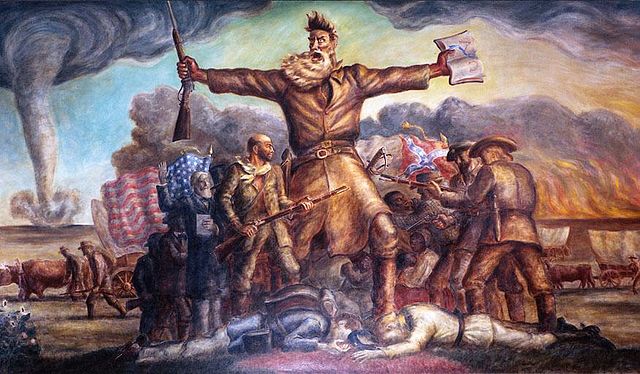As Watchmen unfolds, we learn not only that beloved sheriff Judd Crawford was secretly a white supremacist, but also that the anti-crime Senator Joe Keene is actually directing the Seventh Kavalry. In fact, the Keene and Crawford families are blue bloods of Cyclops.
In the original comic, Senator John David Keene sponsored the Keene Act, which banned masked vigilantes in 1977. Thanks to Petey’s research, we can read a 1955 letter from Keene to Sheriff Dale Dixon Crawford. Keene identifies himself and his fellow Klansmen with figures from the bible and Greek mythology. Keene admires the “valiant men guided by a vision of Manifest Destiny” who first settled the “American Canaan.” His language echoes the Puritans’ identification of white settlers with God’s chosen people, the Israelites.
Even before the Arabella anchored in Massachusetts Bay, John Winthrop described the still nascent colony as a “city on a hill” in his famous 1630 sermon “A Model of Christian Charity.” As Sacvan Bercovitch explains in The American Jeremiad, John Winthrop, John Cotton, and other Puritan ministers believed that New England held a special place in the divine plan. By identifying themselves with the Israelites, they relegated the indigenous people they displaced to the role of heathen Canaanites. Similarly, the 19th century idea of Manifest Destiny–that Americans should expand to the Pacific Ocean–came at Mexico’s expense and relied on the labor of Chinese workers. This idea of America as a divinely chosen nation became ingrained in the national consciousness and a favorite trope of white supremacists.
Not only does Keene identify with the Israelites, but he describes himself and Crawford as “Achaians coming from Troy, beaten off our true course by winds from every direction across the great gulf of the open sea, making for home, by the wrong way, on the wrong courses” as it has “pleased Zeus to arrange it.” Keene likens the Klansmen to the Greek heroes of the Trojan War, like Odysseus and Menelaus who, by Zeus’s will, survived dangerous, circuitous journeys home. As Odysseus violently reclaimed Ithaca from the predatory suitors who assumed him dead, so Keene seeks to reclaim his nation for white men. Sean Illing has observed that contemporary white supremacists treat ancient Greece as the “basis of Western civilization and that these cultures are the exclusive achievements of white men” and Donna Zuckerberg has analyzed the use of “classical imagery to promote a white nationalist agenda.” Keene’s rhetoric, thus, casts white supremacy in a heroic light and implies that his mission is ordained by God.
John David Keene’s son Joe also became a senator and the leader of Cyclops. Joe Keene’s public persona belies his private belief that Redford’s administration has made it “extremely difficult to be a white man in America right now.” With Keene running the Seventh Kavalry and Crawford running Tulsa PD, the apparent war between the two sides could be neatly resolved to make Keene look like a hero and set up his presidential run.
Keene’s plan changed, however, when Angela survived White Night, the Christmas Eve massacre of Tulsa cops. Angela’s husband Cal, who is secretly Dr. Manhattan, instinctively teleported her assailant to New Mexico. Once Keene deduced Cal’s identity, he devised a scheme worthy of a Bond villain to kill Dr. Manhattan and steal his powers. In the show’s finale, Keene delivers a glorious gloating monologue before stepping into a chamber to be transformed into a god. As Lady Trieu informs us, however, Keene forgot to properly filter Dr. Manhattan’s radiation, so all that’s left of Keene is a pool of blood.
While Keene is immolated by his own ambition, Angela inherits Dr. Manhattan’s power. The season ends with the radical image of a black woman as the most powerful being in the galaxy.

